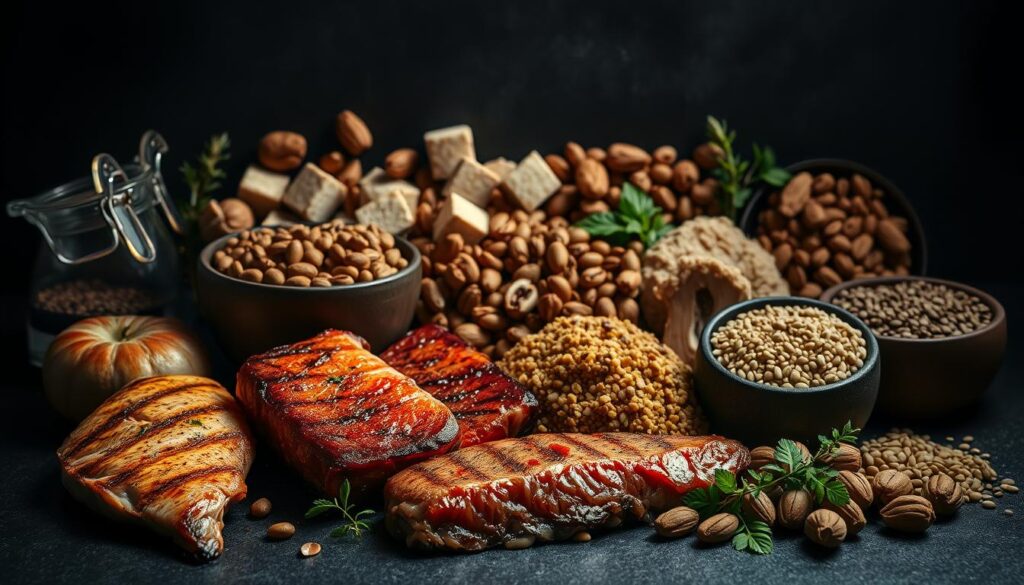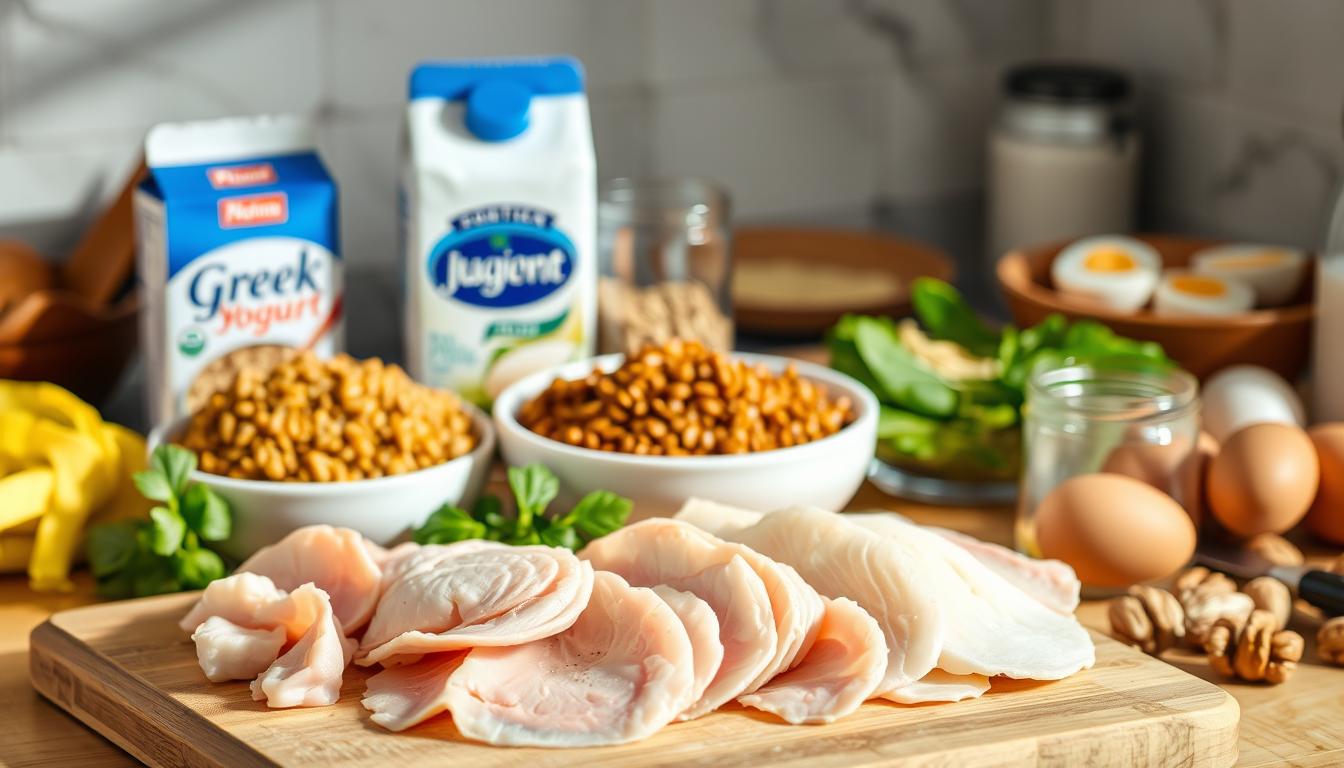As people age, their nutritional needs change, and protein becomes a crucial component of a healthy diet. A protein-rich diet is essential for maintaining overall health and well-being in seniors.
Aging bodies require adequate protein to support muscle health, bone density, and overall physical function. Incorporating high-protein foods into daily meals can help seniors maintain their independence and quality of life.
Key Takeaways
- A protein-rich diet is vital for seniors’ overall health.
- High-protein foods support muscle health and bone density.
- Adequate protein intake helps maintain physical function.
- Incorporating protein-rich foods into daily meals is essential.
- Seniors can maintain their independence with a balanced diet.
Why Protein Becomes Crucial as We Age
Protein plays a critical role in the health of aging individuals, supporting various bodily functions. As people age, their bodies undergo a series of natural changes that affect muscle mass, cognitive function, and immune health.

Understanding Age-Related Muscle Loss
One of the significant changes associated with aging is the loss of muscle mass, known as sarcopenia. This condition can lead to frailty, reduced mobility, and an increased risk of falls. Consuming sufficient protein is essential to mitigate muscle loss. Adequate protein intake helps maintain muscle health by providing the necessary building blocks for muscle repair and growth.
How Protein Supports Cognitive Function and Immune Health
Protein is not only vital for muscle health but also plays a crucial role in supporting cognitive function and immune health. Certain proteins contain amino acids that are involved in the production of neurotransmitters, which are essential for cognitive processes. Moreover, protein helps in the production of antibodies, which are vital for a healthy immune system. A protein-packed diet for seniors can thus contribute to overall well-being by supporting these critical bodily functions.
High-Protein Foods Ideal for Aging Bodies
High-protein foods play a vital role in the diet of older adults, supporting their health and functionality. As individuals age, their bodies undergo various changes that can affect their overall health and strength. Incorporating the right high-protein foods can help mitigate some of these changes.
Lean Animal Proteins: Fish, Poultry, and Dairy
Lean animal proteins are excellent sources of essential amino acids necessary for muscle repair and maintenance. Foods such as chicken, turkey, and fish are not only high in protein but also low in saturated fats, making them ideal for older adults. Additionally, dairy products like Greek yogurt and cottage cheese are rich in protein and calcium, supporting both muscle and bone health.
Plant-Based Protein Sources: Legumes, Nuts, and Seeds
For those preferring or requiring plant-based options, legumes, nuts, and seeds are valuable protein sources. Legumes such as lentils, chickpeas, and black beans are not only rich in protein but also in fiber, supporting digestive health. Nuts and seeds like almonds, chia seeds, and hemp seeds provide a good amount of protein and healthy fats, contributing to overall well-being.
Protein-Fortified Foods and Supplements
In some cases, older adults may benefit from protein-fortified foods and supplements to meet their daily protein needs. Protein-fortified foods can include cereals, bread, and other products that have been enriched with additional protein. Supplements can provide a convenient way to ensure adequate protein intake, especially for those with difficulty consuming enough protein through whole foods alone.
How to Determine Your Daily Protein Requirements
Calculating daily protein intake is essential for seniors to ensure they are consuming enough to support their aging bodies. As people age, their protein needs may change due to factors such as decreased muscle mass and overall health status.
Step-by-Step Guide to Calculate Individual Protein Needs
To determine daily protein requirements, seniors can follow a simple calculation. Generally, the Recommended Dietary Allowance (RDA) suggests 0.8 grams of protein per kilogram of body weight per day for adults. However, older adults may require more protein, with some studies suggesting up to 1.2-1.6 grams of protein per kilogram of body weight daily to support muscle health and overall well-being.
For example, for a senior weighing 70 kilograms, the daily protein intake would be between 84 grams (0.8 grams/kg) and 112 grams (1.6 grams/kg). It’s essential to consult with a healthcare provider to determine the most appropriate protein intake based on individual health needs.
How to Distribute Protein Intake Throughout the Day
Once daily protein needs are determined, it’s crucial to distribute protein intake across meals to maintain muscle health and support overall health. Aim to include a source of protein at each meal.
For instance, a senior requiring 100 grams of protein per day could aim for 25-30 grams of protein per meal across three main meals, and supplement with protein-rich snacks in between if necessary.
By spreading protein intake throughout the day, seniors can help maintain muscle mass, support bone health, and ensure they are getting the nutrients they need for optimal health.
Creating Easy-to-Prepare High-Protein Meals
Preparing high-protein meals can be straightforward and delicious, even for seniors. As people age, their dietary needs change, and consuming enough protein becomes crucial for maintaining muscle mass, bone density, and overall health. Easy-to-prepare high-protein meals can make a significant difference in the daily lives of older adults.
5 Quick High-Protein Breakfast Recipes
Starting the day with a high-protein breakfast is essential. Here are five quick and easy recipes: Greek yogurt with nuts and berries, scrambled eggs with spinach, avocado toast with eggs, smoothie bowl with protein powder and almond milk, and cottage cheese with fruit.
Protein-Packed Lunch and Dinner Ideas
For lunch and dinner, consider incorporating high-protein foods ideal for aging bodies such as lean meats, fish, and plant-based options. Grilled chicken salad, quinoa and black bean bowls, and salmon with roasted vegetables are excellent choices. These meals are not only rich in protein but also provide essential vitamins and minerals.
Simple Protein-Rich Snacks for Between Meals
Snacking between meals can help maintain energy levels. Simple protein-rich snacks include hard-boiled eggs, Greek yogurt, cottage cheese, and mixed nuts. These snacks are easy to prepare and can be taken on the go, making them perfect for older adults.
By incorporating these high-protein meal options for older adults into daily routines, seniors can enjoy a balanced diet that supports their health and well-being.
How to Overcome Common Protein Consumption Challenges
Maintaining a high-protein diet is crucial but challenging for seniors due to several age-related issues. As individuals age, they often encounter obstacles such as decreased appetite, difficulties in chewing and digesting food, and budget constraints, making it hard to consume adequate protein.
Strategies for Improving Appetite
Improving appetite in seniors can be achieved through several strategies. Eating smaller, more frequent meals can make consuming protein easier. Additionally, incorporating flavorful and aromatic foods can stimulate appetite. For instance, adding herbs and spices to meals can enhance flavor without adding salt.
Nutritional Tips: Encourage seniors to eat protein-rich foods like eggs, Greek yogurt, and nuts. These foods are not only high in protein but also palatable and easy to consume.
Solutions for Chewing and Digestion Difficulties
Seniors often face challenges in chewing and digesting food due to dental issues or gastrointestinal changes. Opting for softer protein sources like cooked fish, scrambled eggs, or protein shakes can help. Moreover, modifying food texture, such as finely chopping or pureeing, can make it easier to consume.
- Choose soft, easy-to-chew protein sources.
- Modify food texture to aid digestion.
- Consider protein supplements if necessary.
Finding Budget-Friendly Protein Sources
Consuming protein doesn’t have to be expensive. Seniors can opt for budget-friendly protein sources like beans, lentils, and eggs. Canned fish like tuna and salmon are also affordable and rich in protein. Planning meals around these foods can help maintain a protein-rich diet without breaking the bank.
| Protein Source | Cost Effectiveness | Ease of Preparation |
|---|---|---|
| Beans and Lentils | High | Moderate |
| Eggs | High | Easy |
| Canned Fish | Moderate | Easy |
Integrating Protein with Other Essential Nutrients
Integrating protein with other essential nutrients is key to supporting overall health in older adults. A balanced diet that includes a variety of nutritious foods for healthy aging can significantly impact overall well-being.
Combining Protein and Calcium for Stronger Bones
Combining protein with calcium is crucial for maintaining bone density and preventing osteoporosis. Foods rich in calcium, such as dairy products and leafy greens, should be consumed alongside anti-aging protein sources like lean meats and fish.
Balancing Protein with Fiber for Digestive Health
A diet rich in fiber helps maintain digestive health, preventing constipation and supporting healthy blood sugar levels. Seniors should aim to balance their protein intake with fiber-rich foods like legumes, whole grains, and vegetables.
Proper Hydration for Optimal Protein Utilization
Adequate hydration is essential for the body to effectively utilize protein. Older adults should drink plenty of water throughout the day to support overall health and ensure that their body can efficiently process the protein they consume, aging well with protein-rich foods.
By focusing on a balanced diet that includes protein, calcium, fiber, and adequate hydration, seniors can significantly improve their overall health and quality of life.
Conclusion
A well-balanced diet rich in high-protein foods is essential for aging bodies, supporting overall health and well-being. As discussed, incorporating ideal protein sources into daily meals can significantly impact muscle health, cognitive function, and immune response.
A protein-rich diet for seniors can be achieved by including a variety of high-protein foods ideal for aging bodies, such as lean animal proteins, plant-based options, and protein-fortified foods. By understanding individual protein needs and distributing protein intake throughout the day, seniors can maintain optimal health.
By implementing the recommendations outlined in this article, seniors can take a proactive approach to healthy aging, ensuring they receive the necessary nutrients to support their overall well-being. A balanced diet, combined with a healthy lifestyle, can significantly enhance the quality of life for aging individuals.
